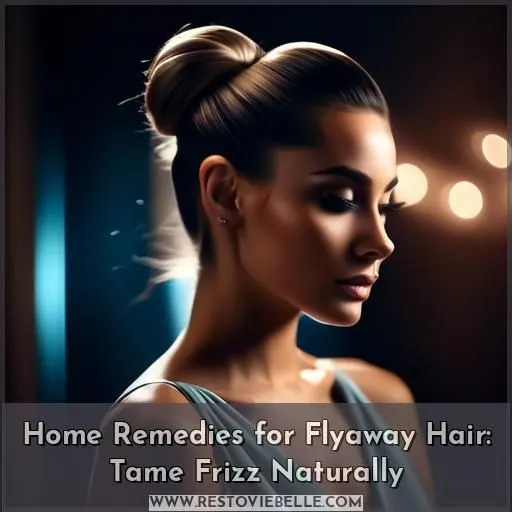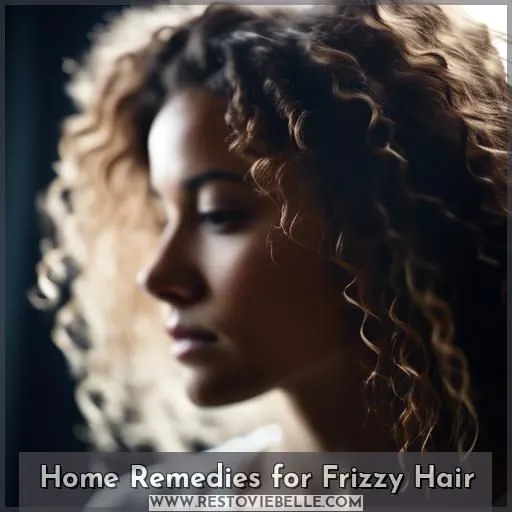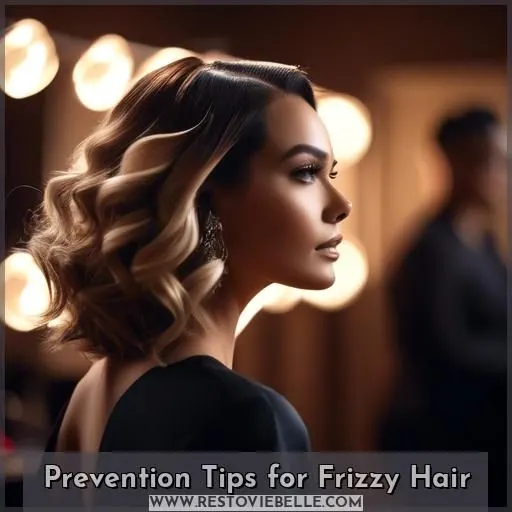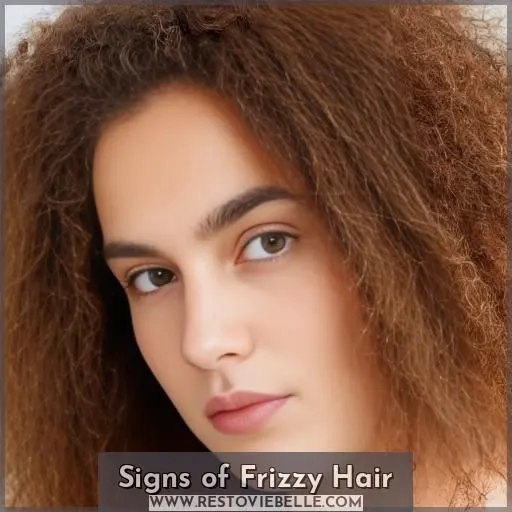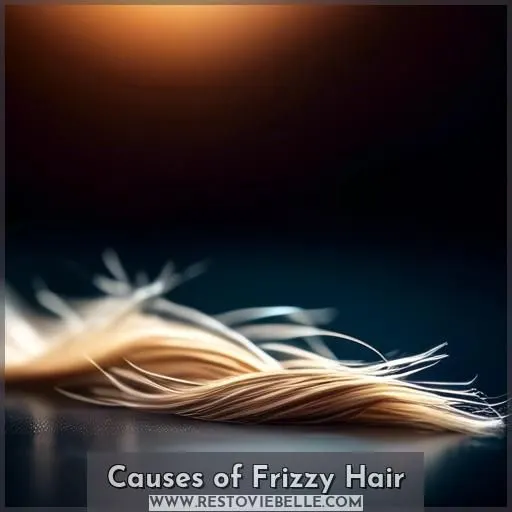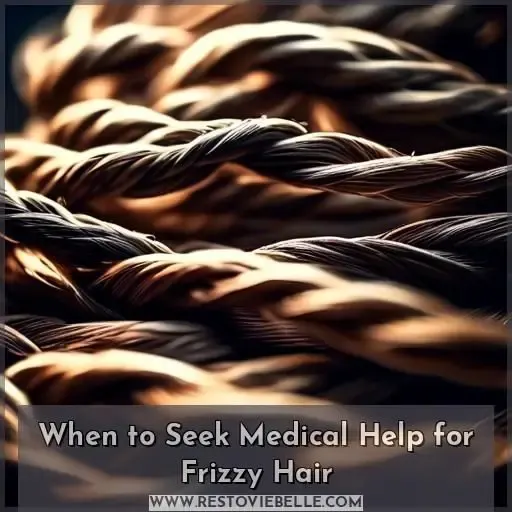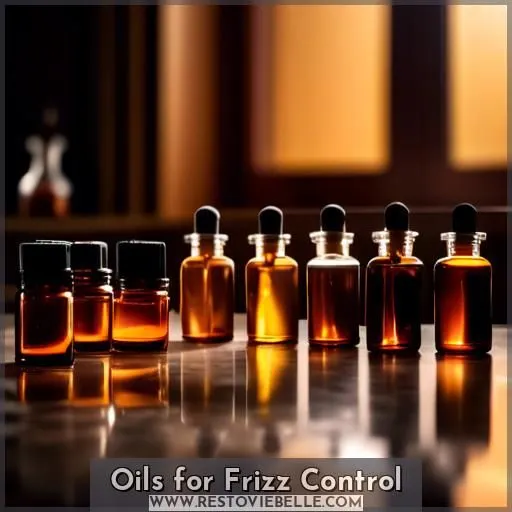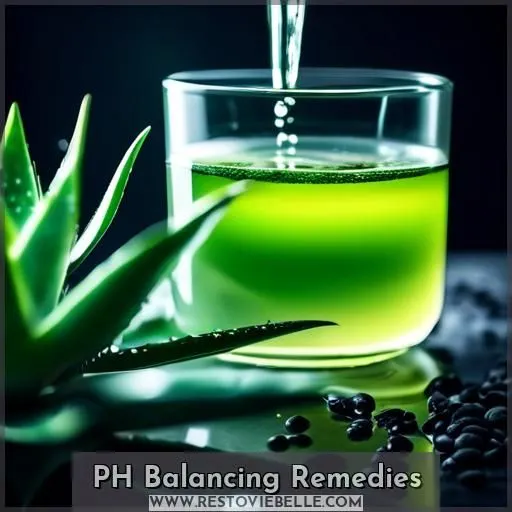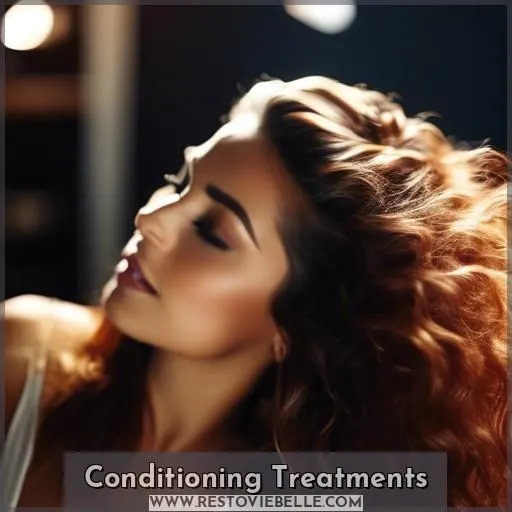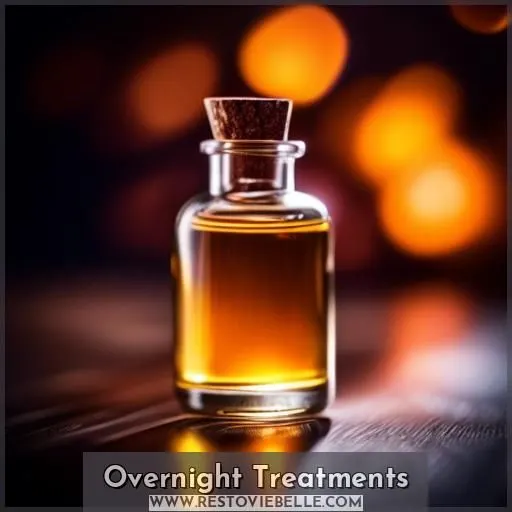This site is supported by our readers. We may earn a commission, at no cost to you, if you purchase through links.
Subdue your unruly hair naturally with these simple home remedies customized to your hair type and requirements. Apple cider vinegar diminishes frizz, eliminates residue, and possesses antibacterial/antifungal properties.
Coconut oil hydrates, minimizes protein loss, and can be utilized as a pre- or post-wash treatment.
Argan oil is abundant in moisturizers, antioxidants, and offers heat protection.
Avocado nourishes and moisturizes, making it ideal for an at-home hair mask.
Eggs foster healthier hair, radiance, and frizz reduction with an egg mask.
Table Of Contents
- Key Takeaways
- Home Remedies for Frizzy Hair
- Apple Cider Vinegar: Reduces Frizz, Removes Residue, Antibacterial/antifungal
- Coconut Oil: Moisturizes, Reduces Protein Loss, Prewash/post-wash Treatment
- Argan Oil: Rich in Moisturizers, Antioxidants, Heat Protection
- Avocado: Nourishes, Hydrates, At-home Hair Mask
- Eggs: Healthier Hair, Shine, Frizz Reduction, Egg Mask
- Prevention Tips for Frizzy Hair
- Signs of Frizzy Hair
- Causes of Frizzy Hair
- When to Seek Medical Help for Frizzy Hair
- Oils for Frizz Control
- PH Balancing Remedies
- Conditioning Treatments
- Overnight Treatments
- Application Instructions
- Frequently Asked Questions (FAQs)
- Conclusion
Key Takeaways
- Apple cider vinegar can help reduce frizz, remove residue, and has antibacterial and antifungal properties, making it an effective rinse for smoother hair.
- Coconut oil is a versatile treatment that can be used both before and after washing to hydrate hair, minimize protein loss, and protect against heat styling.
- Argan oil is rich in moisturizers and antioxidants, providing frizz control, moisture, nourishment, and heat protection for healthier hair.
- Natural ingredients like avocado and eggs can be used to create nourishing hair masks at home, offering deep conditioning and frizz reduction for a smoother, shinier mane.
Home Remedies for Frizzy Hair
To tame flyaway hair, consider using home remedies such as apple cider vinegar, coconut oil, argan oil, avocado, or eggs. These natural ingredients can help reduce frizz, restore moisture, and condition your hair.
Apple Cider Vinegar: Reduces Frizz, Removes Residue, Antibacterial/antifungal
Apple cider vinegar is a versatile ingredient with numerous benefits for your hair. It can help reduce frizz, remove residue, and even fight bacteria and fungus.
To use it as a rinse, mix equal parts apple cider vinegar and water, then pour it over your hair. Let it sit for a few minutes before rinsing it out.
This simple DIY treatment can leave your hair feeling smooth and manageable.
Coconut Oil: Moisturizes, Reduces Protein Loss, Prewash/post-wash Treatment
Coconut oil is a versatile and natural ingredient that can be used to combat frizz and moisturize your hair. Here’s how to use coconut oil as a prewash and post-wash treatment:
- Prewash Treatment: Apply a small amount of warm coconut oil to your hair, focusing on the ends and any frizzy areas. Massage it into your scalp and hair, avoiding the roots to prevent weighing down your hair. Cover your hair with a shower cap or wrap it in a towel and leave it on for 20-30 minutes before shampooing as usual. This will help protect your hair from the harshness of shampoo and provide extra hydration.
- Post-wash Treatment: After shampooing, apply a small amount of coconut oil to your damp hair, focusing on the ends. This will help lock in moisture and protect your hair from heat styling tools. You can also use coconut oil as a leave-in treatment by applying it to your hair while it’s still damp and then styling as usual.
Coconut oil is rich in fatty acids that can penetrate the hair shaft, providing long-lasting moisture and reducing protein loss. It also has antimicrobial properties, which can help keep your scalp healthy and prevent dandruff.
Argan Oil: Rich in Moisturizers, Antioxidants, Heat Protection
Argan oil is a must-have for anyone looking to tame frizz and boost hair health. This Moroccan miracle oil is rich in moisturizers, antioxidants, and heat protection, making it a versatile addition to any hair care routine. Here’s why you should incorporate argan oil into your hair care regimen:
- Frizz Control: Argan oil helps to smooth the hair cuticle, reducing the amount of moisture that enters the hair shaft and causing less frizz.
- Moisture and Nourishment: Rich in fatty acids and vitamin E, argan oil hydrates and nourishes the hair, leaving it soft and manageable.
- Heat Protection: Argan oil acts as a barrier against heat styling tools, protecting your hair from damage and keeping it shiny.
To use argan oil, you can apply a few drops to your hair before styling, or mix it with your favorite hair serum or leave-in conditioner for added benefits. Remember to start with a small amount and adjust as needed to avoid weighing down your hair. With argan oil, you’ll enjoy smoother, healthier, and more manageable hair.
Avocado: Nourishes, Hydrates, At-home Hair Mask
Avocado is a powerhouse for nourishing and hydrating your hair. A homemade avocado mask can act as a nourishing conditioner, providing a hydrating hair treatment. This DIY hair therapy is an easy way to incorporate natural ingredients into your beauty routine.
Simply mash an avocado and apply it to your hair as a mask. Let it sit for 15-20 minutes before rinsing. Avocado’s rich nutrients will leave your hair feeling soft and silky.
Eggs: Healthier Hair, Shine, Frizz Reduction, Egg Mask
Eggs are a versatile ingredient for healthier hair. Here’s how they can help:
- Protein: Eggs provide protein, which strengthens hair and reduces frizz.
- Shine: The yolk is rich in vitamins that add shine to your hair.
- Egg Mask: Mix egg whites with olive oil or apple cider vinegar for a frizz-reducing mask.
Incorporate eggs into your hair care routine for a natural, effective solution to frizz.
Prevention Tips for Frizzy Hair
You’re looking for ways to keep your hair smooth and manageable, and prevention is key. By avoiding overshampooing, using cooler water, protecting your hair from humidity, and covering it during exercise, you can dramatically reduce frizz.
Avoid Overshampooing
Avoid overshampooing to prevent frizzy hair. Over-washing can strip your hair of its natural oils, leading to dry scalp, hair loss, greasy hair, and frizzy hair. Opt for a leave-in conditioner to maintain moisture and use a gentle shampoo that doesn’t strip your hair. Remember, a little goes a long way, so don’t overdo it.
Reduce Heat (cool/warm Water)
Reducing heat in your hair care routine can notably minimize frizz. Choose cool or warm water when washing your hair, as hot water can harm your hair and increase frizz. Use heat protection products like olive oil or lemon juice before styling.
Consider using a silk pillowcase or sleeping on a satin scarf to safeguard your hair from friction-induced frizz. Honey can also be used as a natural heat shield when applied to damp hair before styling.
Protect From Humidity (hats, Scarves, Serums)
Protect your hair from humidity with hats, scarves, or serums. Hats and scarves shield your hair from the elements, while serums create a barrier against humidity. Embrace home remedies like apple cider vinegar or coconut oil to tame flyaways naturally.
De-frizz Without Eliminating Exercise (cover Hair)
- Cover your hair with a gym cap or headband during workouts.
- Use a heat protectant styling product before heading to the gym.
- After your workout, rinse your hair with cool water and apply a leave-in conditioner to lock in moisture.
Signs of Frizzy Hair
You might notice your hair doesn’t lie flat and is tough to manage, which are classic signs of frizz. If it feels rough, looks dull, or you’re seeing split ends, these are indicators that your hair is frizzy and needs attention.
Hair Strands Do Not Align
If your hair strands don’t align, it’s a sign of frizz. Frizzy hair can be caused by a dry climate, styling tools, chemical treatments, or scalp health issues. To combat this, try using home remedies like apple cider vinegar or a hot oil treatment. Remember, healthy hair has an acidic pH, so maintaining a balanced pH can help reduce frizz.
Hair is Difficult to Comb
When your hair is difficult to comb, it can be a sign that it’s frizzy. This is often due to the cuticle layer of your hair being raised, which allows moisture to pass through and swell the strands. To combat this issue, you can incorporate home remedies and hair care habits to help tame your frizzy hair.
Home Remedies:
- Apple Cider Vinegar: This natural ingredient can help restore your hair’s pH balance, reducing frizz and removing residue.
- Coconut Oil: Apply coconut oil as a prewash or post-wash treatment to moisturize your hair and reduce protein loss.
- Argan Oil: Rich in moisturizers and antioxidants, argan oil can help protect your hair from heat damage and frizz.
- Avocado: Create a homemade hair mask with avocado to nourish and hydrate your hair, reducing frizz.
- Eggs: Use eggs in a hair mask to provide your hair with essential nutrients, promoting healthier hair and reducing frizz.
Prevention Tips:
- Avoid overshampooing, as this can strip your hair of natural oils and lead to frizz.
- Reduce heat by using cool or warm water when washing your hair.
- Protect your hair from humidity by wearing hats or scarves, or using hair serums with humidity protection.
- De-frizz without eliminating exercise by covering your hair with a shower cap or scarf during workouts.
- Prioritize hair care by incorporating weekly masks and frizz-reducing products into your routine.
Rough Hair
Your hair care routine is essential for taming unruly, frizzy hair. Include natural treatments like apple cider vinegar, coconut oil, and egg masks in your hair care regimen. Avoid harsh shampoos and heat styling. Use products that protect against humidity and maintain a healthy pH for optimal hair health.
Dull Hair
Lackluster hair can be a disheartening issue, but it’s not insurmountable. Here are some prevalent causes of dull hair and how to tackle them:
- Product accumulation: Gradually, hair and scalp can gather residue from shampoo and styling products, which can hinder natural hair oils from permeating the hair shaft, leading to dullness. To combat this, clarify your hair regularly using a clarifying shampoo or a homemade remedy like apple cider vinegar and water.
- Hard water: The minerals in hard water can act as a barrier that moisture can’t penetrate, causing dryness and dullness. If you reside in an area with hard water, contemplate using a chelating shampoo to remove mineral build-up or install a water softening system in your home.
- Excessive heat styling: Frequent use of hot tools can impair the cuticle, diminishing your hair’s innate shine. To minimize damage, employ heat protection products and limit heat styling. Air drying or using lower heat settings when necessary can also aid in preserving shine.
- Sun damage: Prolonged exposure to the sun’s UV rays can cause the outer protective layer of your hair to become damaged, leading to dryness and frizziness. Safeguard your hair by donning a hat or scarf when outdoors, and utilize a UV-protective hair care product.
- Diet and hydration: A diet deficient in essential nutrients and adequate hydration can contribute to dull hair. Ensure you’re consuming a balanced diet rich in vitamins, minerals, and healthy fats, and stay hydrated by drinking ample water.
- Pregnancy or hormonal changes: Hormonal shifts during pregnancy or other life changes can induce hair to become dull and brittle. This is often temporary and may resolve once hormone levels stabilize.
To restore luminosity to your hair, try incorporating home remedies like apple cider vinegar rinses, egg yolk masks, or avocado hair masks. These treatments can aid in nourishing and hydrating your hair, enhancing its overall appearance and shine.
Split Ends
Split ends are a common sign of frizzy hair. They occur when the hair’s outer layer, or cuticle, is damaged, leading to porosity and increased frizz. To combat this, consider your hair type and porosity when choosing hydrating hair care products. Regular deep conditioning and hydration treatments can also help.
A healthy hair care routine is key to taming flyaway hair.
Causes of Frizzy Hair
Frizzy hair can be caused by several factors, including dry hair, humidity, and damage from styling tools or chemical treatments. Dry hair lacks moisture, causing the cuticle to lift and allowing moisture to enter, swelling the hair strands and creating frizz. Humidity worsens frizz by causing hair to absorb excess moisture, which can disrupt the curl pattern and lead to frizz.
Dry hair absorbs moisture, swelling the cuticles and causing frizz. Hot oil treatments, mayonnaise, apple cider vinegar, avocado, and egg whites can all contribute to frizzy hair by either drying out the hair or causing it to absorb too much moisture.
Dry Hair Lacks Moisture
Dry hair lacks moisture, causing cuticle damage and frizz. Humidity worsens the issue. Maintain hair health with moisture-rich products and avoid harsh treatments.
Humidity Worsens Frizz
Humidity can exacerbate frizzy hair by causing the hydrogen bonds in your hair to break and reform, leading to a frizzy appearance. To combat frizz caused by humidity, consider the following tips:
- Hair Protection: Use hair products specifically designed to protect against humidity, such as anti-humidity sprays or serums.
- Humidity Control: Adjust your hair care routine to minimize exposure to humidity. For example, air-dry your hair instead of using a blow dryer, and avoid heat styling tools that can strip moisture from your hair.
- Cuticle Sealing: Apply a leave-in conditioner or hair mask to seal the cuticle and lock in moisture, helping to prevent frizz.
- Moisturize: Keep your hair hydrated by using moisturizing shampoos and conditioners, and consider incorporating a weekly deep conditioning treatment.
- Haircare: Avoid over-washing your hair, as this can strip it of natural oils and make it more prone to frizz.
Dry Hair Absorbs Moisture, Swelling Cuticles
When your hair acts like a sponge in humidity, it’s a cry for help, signaling dry scalp, hair damage, and thirst for care.
Hot Oil Treatments
Hot oil treatments can be a game-changer for those dealing with frizzy hair. These treatments involve using heated oil to nourish your strands from root to tip, with the heat helping to refine the oil and make it easier for the molecules to penetrate the hair shaft. Once inside the hair shaft, the fatty acids in the oil deposit moisture, helping to repair and prevent split ends and strengthen the cuticle from the root.
To get the most out of a hot oil treatment, apply it to freshly washed hair. This allows the oil to deeply penetrate the hair cuticle, providing the best results. You can use a variety of oils for hot oil treatments, such as coconut oil, olive oil, almond oil, and argan oil. Remember to choose high-quality oils and do a patch test before applying them to your hair to guarantee you don’t have any adverse reactions.
Hot oil treatments are ideal for anyone with normal to dry, frizzy hair. However, they may not be suitable for those with thinning hair or damaged scalps. To get the best results, apply the oil to your hair, cover it with a shower cap or plastic bag, and let it absorb for at least 30 minutes before washing it out with a clarifying shampoo.
For greatest benefits, consider using hot oil treatments every other week if you have natural hair, curly hair, bleached or damaged hair. If your hair is fine or tends to get oily fast, you may only need to do a hot oil treatment once or twice a month.
Mayonnaise
Mayonnaise, a ubiquitous household staple, can be utilized as a hair mask to revitalize and nurture your tresses. Its composition of oils, eggs, and other elements can assist in rehabilitating the well-being of parched, fragile, or unruly hair. Here’s how to employ it:
- Prepare the Mayonnaise: Obtain ½ cup of mayonnaise at room temperature and blend it with 2 tablespoons of honey and 1 tablespoon of apple cider vinegar until a homogeneous mixture is achieved.
- Apply the Mask: Apply the mixture to your moistened hair, ensuring coverage of both hair and scalp. Allow it to remain for 1 hour.
- Wash It Off: After 1 hour, cleanse your hair with shampoo to remove the mayonnaise. There’s no requirement to apply conditioner; the mayonnaise has already fulfilled that function.
Mayonnaise can contribute to the restoration of your hair’s health by nourishing it and leaving it supple, silky, and lustrous. It presents a cost-effective solution in lieu of pricey conditioning products. However, it’s prudent to exercise caution, as mayonnaise shouldn’t be applied to hair that exhibits oiliness or greasiness, as it has the potential to exacerbate these conditions.
Apple Cider Vinegar
Apple cider vinegar is a versatile ingredient that can benefit your hair in several ways. Here are three ways it can help manage frizzy hair:
- Balances pH levels: Apple cider vinegar has an acidic pH, which can help restore the natural balance of your hair’s pH. This is particularly beneficial for those with alkaline hair, as it can close the cuticle layer, making hair smoother and less frizzy.
- Fights product build-up: Apple cider vinegar can help remove product build-up from your hair and scalp, which can contribute to frizz. It acts as a gentle exfoliant, removing excess sebum and dead skin cells, leaving your hair cleaner and more manageable.
- Moisturizes hair: The acidic nature of apple cider vinegar can help to restore moisture to your hair, reducing frizz and making it more manageable. It can also help to detangle your hair, making it easier to style and reducing the risk of breakage.
To use apple cider vinegar for frizzy hair, you can try the following methods:
- Rinse: Mix equal parts apple cider vinegar and water, then apply the mixture to your hair after shampooing. Leave it on for a few minutes before rinsing thoroughly.
- Mask: Combine 1 tablespoon of apple cider vinegar, 3-4 tablespoons of plain water, and 3 tablespoons of organic honey. Apply this mixture to your hair and leave it on for 30-40 minutes before rinsing.
- Scalp treatment: Mix 1 teaspoon of honey, 1 egg, and 1 tablespoon of apple cider vinegar. Apply this mixture to your scalp and leave it on for 30 minutes before shampooing.
Remember to dilute apple cider vinegar with water before applying it to your hair, as undiluted vinegar can be too harsh and may cause damage. Always do a patch test before applying any new hair treatment to make certain it’s suitable for your hair type and scalp sensitivity.
Avocado
Avocado, a popular ingredient in your kitchen, can also be used as a nourishing hair mask. Its healthy fats and vitamins hydrate hair, reducing frizz and giving your locks a shiny glow. Try smearing some mashed avocado onto your hair before shampooing for an at-home spa treatment.
Egg Whites, Apple Cider Vinegar, Olive Oil
Mix egg whites, apple cider vinegar, and olive oil for a hair mask that prevents damage, offering shine and frizz control.
When to Seek Medical Help for Frizzy Hair
If you’re experiencing unexplained symptoms, no improvement with home care, hair breakage or loss, or side effects from medications or treatments, it’s time to seek professional help. Don’t wait for your frizzy hair to worsen – consult a healthcare provider or a dermatologist for personalized advice and treatment options.
Unexplained Symptoms
If you’re experiencing unexplained symptoms with your frizzy hair, it might be time to seek medical help. A physical examination, medical history, and diagnostic testing can help identify any underlying health conditions that may be contributing to your hair issues.
If home remedies and preventative measures aren’t providing the desired results, consult a healthcare professional to rule out any potential underlying causes.
No Improvement With Home Care
If you’ve been attempting home remedies for unruly hair but haven’t witnessed any improvement, it may be time to seek professional assistance. There could be underlying issues such as nutritional deficiencies, hormonal imbalances, or stress that are causing your hair to become frizzy.
If your hair appears dry, brittle, or lacks luster, it could be a sign of a more serious issue. In such instances, it’s paramount to consult a healthcare professional or a dermatologist for an accurate diagnosis and treatment regimen.
They can aid you in pinpointing the root cause of your frizzy hair and suggest appropriate solutions, which may encompass dietary alterations, stress management strategies, or medical interventions. Remember, it’s imperative to address any underlying health concerns to safeguard your hair’s health and overall well-being.
Hair Breakage or Loss
If you’re encountering hair breakage or loss, it’s imperative to seek professional medical advice to eliminate any underlying health concerns. Hair breakage can be attributed to various factors, encompassing stress, dietary habits, and specific medical conditions.
While home remedies may offer temporary relief, it’s vital to tackle the fundamental cause of the issue for enduring solutions. A medical consultation can assist you in pinpointing the root cause and recommending suitable treatment options.
Side Effects From Medications or Treatments
If you’re experiencing side effects from medications or treatments that are causing frizzy hair, it’s imperative to consult your doctor for guidance. Some medications, such as retinoids, hydroxychloroquine (Plaquenil), and certain antidepressants, have been reported to cause changes in hair texture, including curliness. These changes can be attributed to medications affecting the epidermal growth factor receptor (EGFR) or other factors that influence hair growth and development.
If you suspect that your hair texture change is a result of a medication you’re taking, consult your doctor for guidance. They can determine if the change is a side effect of a medication, help you understand the potential reasons behind the change, and suggest possible solutions or alternative medications if necessary.
In the meantime, you can take steps to manage and care for your frizzy hair. Choose the right shampoo and conditioner, look for products specifically designed for curly hair, and avoid harsh chemicals like sulfates, silicones, and parabens. Use gentle styling techniques, such as air drying and using a wide-tooth comb to detangle your curls, and keep your hair well-hydrated by using leave-in conditioners and deep conditioning treatments specifically designed for curly hair. Schedule regular trims to remove split ends and maintain healthy hair growth.
Oils for Frizz Control
To tame flyaway hair naturally, turn to oils for frizz control. Try using Vitamin E and coconut oil for repair and conditioning, olive oil and egg for moisture and smoothness, or almond oil and aloe vera for protection and nourishment.
Vitamin E and Coconut Oil
To tame your frizz naturally, try using Vitamin E and coconut oil. Vitamin E repairs hair damage, while coconut oil conditions your hair. Mix them together and use as a pre-shampoo treatment or leave it on overnight for best results. This oil blend will moisturize your hair, reduce protein loss, and leave your strands smooth and shiny.
Olive Oil and Egg
Just as coconut oil leaves your locks lusciously tamed, olive oil’s conditioning prowess pairs perfectly with egg benefits for a double punch against frizz. Whip up this duo for a hair smoothening treatment; a scalp massage before bed can turn it into an overnight miracle. Wake up to hair that’s as smooth as silk.
Almond Oil and Aloe Vera
Almond oil and aloe vera are two ingredients that can help tame frizz and improve the overall health of your hair. Almond oil is rich in vitamin E, which repairs hair damage, and vitamin A, which fights hair damage. It also contains omega-3 and omega-6 fatty acids, which help moisturize and strengthen hair. Aloe vera, on the other hand, is known for its soothing qualities and can boost scalp health, minimize moisture loss, and make hair soft. When combined, these two ingredients can create a potent mixture that improves scalp health and promotes hydration.
To use almond oil and aloe vera for frizz control, you can mix equal parts of each ingredient and apply the mixture to your scalp and hair. Massage it in gently and leave it on for an hour or overnight before washing it off with a gentle shampoo. This treatment can help tame frizz, leaving your hair looking sleek and polished.
PH Balancing Remedies
Balancing your hair’s pH is essential for maintaining healthy hair and reducing frizz. Here are four pH balancing remedies to keep your hair cuticle closed and smooth:
- Apple Cider Vinegar: Restores hair’s pH balance and reduces frizz by closing the cuticle. Mix equal parts apple cider vinegar and water, apply to damp hair, and rinse after 15 minutes.
- Baking Soda: Neutralizes the scalp’s pH, preventing frizz. Mix 1 tablespoon baking soda with 1 cup water, apply to scalp, and rinse after 15 minutes.
- Lemon Juice: Increases hair’s pH, making it more resistant to humidity. Mix 1 tablespoon lemon juice with 1 cup water, apply to damp hair, and rinse after 15 minutes.
- Honey: Acts as a pH balancer and humectant, sealing the cuticle. Mix 1 tablespoon honey with 1 cup water, apply to damp hair, and rinse after 15 minutes.
Conditioning Treatments
Yogurt and honey are potent natural conditioning treatments for frizzy hair. Yogurt abounds in proteins that aid in strengthening hair and averting breakage, while honey’s natural moisturizing attributes nurture the hair shaft.
To utilize, blend a cup of yogurt with 2 tablespoons of honey, apply to damp hair, and leave on for 15-20 minutes prior to rinsing. This home conditioning treatment not merely moisturizes but also imparts shine and softness to your hair.
Overnight Treatments
Overnight treatments are an effective way to deeply moisturize and detangle your hair, reducing frizz. Here are four options to try:
- Aloe Vera and Almond Oil: Mix equal parts aloe vera and almond oil, apply to hair, and leave on overnight. Rinse with gentle shampoo in the morning.
- Vitamin E and Coconut Oil: Mix vitamin E oil with coconut oil, apply to hair, and leave on overnight. Wash out with a gentle shampoo in the morning.
- Yogurt and Honey: Combine yogurt and honey, apply to hair, and leave on for 30-40 minutes. Rinse with cool water and air dry.
- Egg and Olive Oil: Mix one egg with olive oil, apply to hair, and leave on for 40 minutes. Rinse with a gentle shampoo and warm water.
These treatments will leave your hair soft, manageable, and frizz-free.
Application Instructions
After considering overnight treatments, let’s delve into the methodology of integrating these natural remedies into your hair care regimen. It’s not quantum physics, but a hint of meticulousness guarantees your tresses receive the adoration they warrant. Here’s a concise guide:
| Treatment | Application Time | Rinse Method |
|---|---|---|
| Vitamin E and Coconut Oil | 40 mins before washing | Mild shampoo |
| Apple Cider Vinegar | Apply, leave for minutes | Rinse, let dry naturally |
| Egg and Olive Oil | 40 mins to an hour | Mild shampoo |
| Yogurt and Honey | 30-40 mins | Mild shampoo |
| Aloe Vera and Almond Oil | 1 hour or overnight | Mild shampoo |
Frequently Asked Questions (FAQs)
What are the best home remedies for flyaway hair?
To tame flyaway hair, consider using home remedies that help control frizz and add moisture to your locks. Here are some effective remedies:
- Aloe Vera Gel: Apply a small amount of aloe vera gel to your hair to keep flyaways in place. The moisturizing properties of aloe vera can help combat frizz and flyaways.
- Petroleum Jelly: A little bit of petroleum jelly can minimize moisture loss and make your hair smooth and shiny, reducing flyaways.
- Almond Oil: Almond oil can keep moisture locked in your hair shaft, preventing flyaways and giving your hair a healthy shine.
- Mayonnaise: This powerhouse of hair-benefiting protein can soften your hair’s texture and control flyaways.
- Apple Cider Vinegar: Rinse your hair with apple cider vinegar once a week to up your hair’s hydration factor and minimize flyaways.
- Yogurt and Honey: Combine yogurt and honey for a conditioning treatment that nourishes your hair and controls flyaways.
- Vitamin E Oil: Apply vitamin E oil to your hair to minimize moisture loss and boost hydration, helping to reduce flyaways.
How often should I use home remedies for flyaway hair?
To control flyaway hair, you can use home remedies such as honey, egg white, vitamin E oil, almond oil, petroleum jelly, and aloe vera gel. These remedies can help tame flyaways, nourish your hair, and provide hydration.
You can apply these remedies once or twice a week, depending on the specific remedy and your hair’s needs. For example, you can use honey in your weekly mask, egg white with lemon juice on a weekly basis, vitamin E oil twice a week, almond oil as needed, petroleum jelly as needed, and aloe vera gel as needed.
Always follow the instructions provided with each remedy to achieve the best results.
Can I use these home remedies for frizzy hair as well?
Taming frizzy hair is like smoothing out life’s rough edges. Yes, these home remedies can also be your secret weapon against frizz, offering a natural path to hair that’s as free as your spirit.
How do I apply these home remedies for flyaway hair?
To apply home remedies for flyaway hair, follow these steps:
- Apply Apple Cider Vinegar Hair Mask: Mix 1/2 teaspoon apple cider vinegar with water and apply it to your scalp. Leave it on for 40-45 minutes and wash off with regular shampoo and cold water.
- Use Egg White and Apple Cider Vinegar Hair Mask: Mix 1 egg white with 1 tablespoon of apple cider vinegar and apply it to your scalp. Leave it on for 20-30 minutes and rinse off with cool water.
- Apply Egg Yolk and Olive Oil Hair Mask: Mix 2 egg yolks with 2 tablespoons of olive oil and apply it to your hair. Let it sit for at least 20-30 minutes and rinse off with cool water.
- Use Egg Yolk and Aloe Vera Hair Mask: Mix 2 egg yolks with 2 tablespoons of aloe vera gel and apply it to your hair. Let it sit for 20-30 minutes and rinse off with cool water.
- Apply Egg Yolk and Coconut Oil Hair Mask: Mix 2 egg yolks with 2 tablespoons of coconut oil and apply it to your hair. Let it sit for 20-30 minutes and rinse off with cool water.
- Use Egg Yolk and Fenugreek Hair Mask: Mix 1 egg yolk with 1 tablespoon of fenugreek powder, 1 tablespoon of olive oil, 1 tablespoon of honey, and 1/2 cup of plain yogurt. Apply it to your hair, starting at the roots and working your way down to the ends.
- Apply Mayonnaise Hair Mask: Apply mayonnaise to your hair, cover it with a shower cap, and let it sit for an hour before shampooing.
- Use Mayonnaise and Milk Hair Mask: Combine 1/2 cup mayonnaise, 1 tablespoon honey, and 1 tablespoon milk. Apply it to your hair, cover it with a shower cap, and let it sit for an hour before shampooing.
- Use Mayonnaise and Vinegar Hair Mask: Mix 1/2 cup mayonnaise with 1 tablespoon vinegar (distilled or apple cider) or 1 tablespoon lemon juice. Apply it to your hair, cover it with a shower cap, and let it sit for an hour before shampooing.
- Apply Mayonnaise and Egg White Hair Mask: Separate an egg white from the yolk, mix it with 1/2 cup mayonnaise, and apply it to your hair. Cover it with a shower cap and let it sit for an hour before shampooing.
Remember to apply these masks to damp hair and rinse them off with cool water. For best results, use these masks once a week.
Can I combine different home remedies for flyaway hair?
Yes, you can combine different home remedies for flyaway hair. For example, you can mix apple cider vinegar with almond oil or honey for an even more effective treatment. Just be sure to follow the instructions for each individual remedy to guarantee the best results.
Conclusion
Harness the potency of nature to quell your unruly hair with these effortless home remedies. From apple cider vinegar to coconut oil, argan oil, avocado, and eggs, each remedy is curated to suit your hair type and requisites, guaranteeing a tamed, healthy, and luminous mane. Embrace these natural remedies and bid farewell to unruly hair forever.

